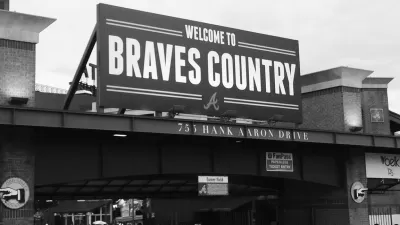A columnist absolutely eviscerates the Atlanta Braves organization as it plays its final game in Turner Field in Atlanta. The team is departing the city for a new suburban stadium in Cobb County.

"When Major League Baseball’s Atlanta Braves wrap up their final game at Turner Field on Oct. 2 against the Detroit Tigers, they’ll be throwing away a gift they never deserved," according to an article by Marketwatch columnist Jason Notte. "They’re tossing aside a 20-year-old ballpark in Atlanta proper for a $700 million SunTrust Park in Georgia’s suburban Cobb County for one of the most specious reasons imaginable: The city wasn’t paying them enough money or attention to stay."
According to Notte, Turner Field was a gift to the baseball gods, thanks to the legacy of the 1996 Summer Olympics, hosted in Atlanta. After NBC, sponsors, and the Atlanta Committee for the Olympic Games paid the $209 million cost for the stadium, it was "converted into a ballpark and handed over to the Atlanta Fulton County Recreation Authority in 1997. That group leased the building to the Braves while letting them operate it."
The greed of the Braves, as Notte describes it, came later, after the team's fortunes turned on the field and the team's management came looking for concessions off the field.
By 2012, the Braves were demanding complete control of Turner Field (for which they hadn’t paid a dime), 55 acres of city- and Fulton County-owned land around Turner Field (which it didn’t want to bid for) and complete control over redevelopment. The city pointed out that this flouted any number of laws, which sent the Braves scurrying over to Cobb County by July 2012. Just four months later, the Braves announced their deal for a new stadium and retail development in Cobb County.
According to Notte, the deal the team made with Cobb County, which he also analyzes, is more about private benefit that public partnership.
FULL STORY: Ungrateful Atlanta Braves take the money and run

Alabama: Trump Terminates Settlements for Black Communities Harmed By Raw Sewage
Trump deemed the landmark civil rights agreement “illegal DEI and environmental justice policy.”

Study: Maui’s Plan to Convert Vacation Rentals to Long-Term Housing Could Cause Nearly $1 Billion Economic Loss
The plan would reduce visitor accommodation by 25% resulting in 1,900 jobs lost.

Why Should We Subsidize Public Transportation?
Many public transit agencies face financial stress due to rising costs, declining fare revenue, and declining subsidies. Transit advocates must provide a strong business case for increasing public transit funding.

Wind Energy on the Rise Despite Federal Policy Reversal
The Trump administration is revoking federal support for renewable energy, but demand for new projects continues unabated.

Passengers Flock to Caltrain After Electrification
The new electric trains are running faster and more reliably, leading to strong ridership growth on the Bay Area rail system.

Texas Churches Rally Behind ‘Yes in God’s Back Yard’ Legislation
Religious leaders want the state to reduce zoning regulations to streamline leasing church-owned land to housing developers.
Urban Design for Planners 1: Software Tools
This six-course series explores essential urban design concepts using open source software and equips planners with the tools they need to participate fully in the urban design process.
Planning for Universal Design
Learn the tools for implementing Universal Design in planning regulations.
Caltrans
Smith Gee Studio
Institute for Housing and Urban Development Studies (IHS)
City of Grandview
Harvard GSD Executive Education
Toledo-Lucas County Plan Commissions
Salt Lake City
NYU Wagner Graduate School of Public Service




























